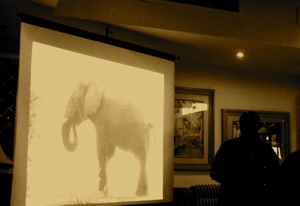
LUSAKA, ZAMBIA — "If you live on a small farm, as I do, your last prayer at night is that an elephant won't find your maize field," Dr. Mannasseh Phiri told an audience of African health journalists today. "It will wipe it out."
Phiri is a quietly compelling speaker and so he had the audience's attention as he went on to describe the feeding habits of elephants.
With small snouts and small mouths, they can only take in a little at a time, so they eat all day long. And as they search for food, they walk quietly; they don't run.
Yes, he was relating the reasons you don't want an elephant walking through your maize field, with the AIDS epidemic.
And it added up to a strong argument for journalists taking the lead in fighting the AIDS epidemic, one story at a time.
In Zambia, he said, the epidemic causes the deaths of 250 people a day. As we met in that room, at one of Lusaka's shmancy hotels, another room across the lobby was filled with more people, otherwise unrelated, but also talking about the AIDS epidemic.
Phiri estimated that about 20 groups were meeting this day, in this city alone, to talk about the AIDS pandemic. Nearly 30 years on.
And yet with all the big numbers, all he was asking the journalists to do was ask themselves how they could stop the next infection.
It is a goal within their reach.
While the topic of the day was how media and parliamentarians in Africa can work together to fight the epidemic, Phiri doesn't think much of the power of parliament members right now. That may be because Phiri, who was a physician when the epidemic took off across his country has grown frustrated with the notion of waiting for solutions from the those people assume will take care of crises. But it is also because, and he made a mathematical case for this, the answers lie in everyone who is affected.
And these days it is married people.
His flow chart -- I guess that's exactly what you'd call it -- showed how. It may be familiar to anyone who has read Helen Epstein's Invisible Cure, as well as anyone following the epidemic here, but his explanation, and his way of personalizing a point ("when did you last have sex? Do you ever talk about how it was?" and "I think if we all went away by ourselves and listed everyone we've had sex with, and they listed everyone they had sex with -- I think we would find out we have all had sex with each other" ) helped clarlify the issues.
While Africans have dealt with the leveled lives and suffering on every front -- education, economy, fractured families that the epidemic brought with the greatest force here -- the label of promiscuity has added insult to injury people who are likelier, if anything to have fewer sexual partners in their lifetimes than Americans and Europeans.
The problem is that many of those relationships are likely to overlap -- to be concurrent -- making the odds higher of passing on the virus in the first weeks after one gets it, when the immune system hasn't started to fight it, and its levels are the highest. The reasons for those overlapping relationships stem from tradition, yes, but also from rattled economies -- giving some men the means to support a couple of families, and women -- needing enough relationships to bring in help for rent, food, and school fees.
It is complicated, as human conditions tend to be. It was a nice change that the elephant in the room wasn't being ignored.